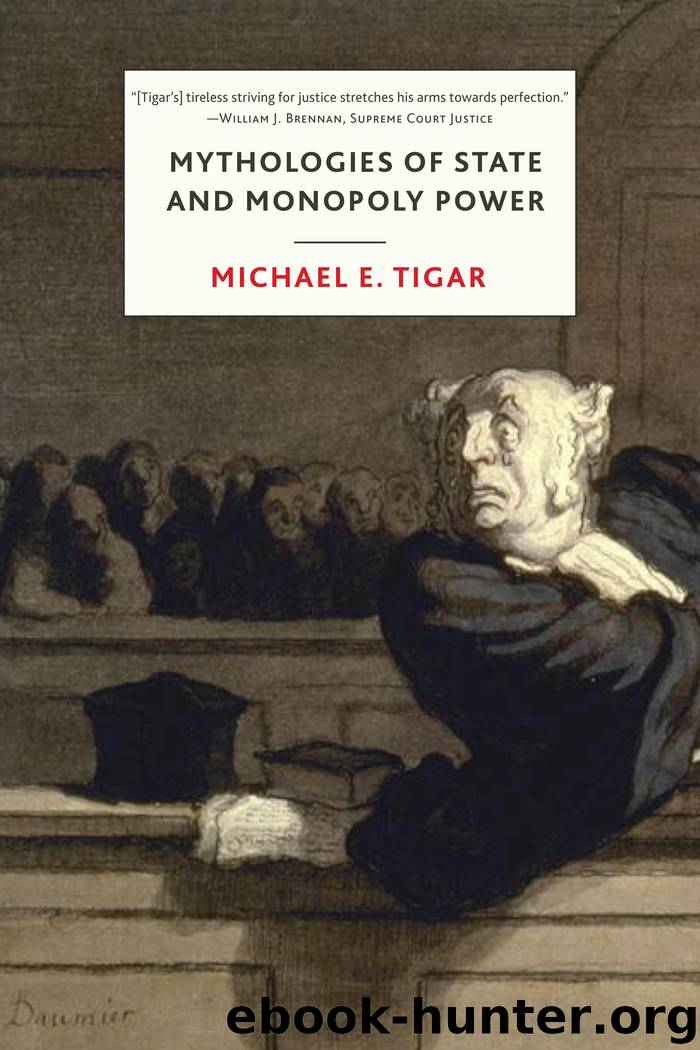Mythologies of State and Monopoly Power by Michael Tigar

Author:Michael Tigar [Tigar, Michael]
Language: eng
Format: epub
ISBN: 9781583677445
Publisher: New York University Press
Published: 2018-01-15T07:00:00+00:00
ABOLISHING “FEUDALISM”: A MYTHOLOGY OF FREEDOM
The private property norm, wielded by judges on behalf of owners, dissipates the mythology of “free government by free men,” animated by the free exchange of information and ideas. The notion of “private” property traces deep historical roots.65
In the feudal period, use of land was regulated by the relationship of a secular or ecclesiastical overlord or seigneur and the vassals who pledged homage to him. In the part of Europe once ruled from Rome, feudalism represented the retreat into the manor and village of a ruling class deprived of protection by a decayed and dying imperial government. Elsewhere, it was a change from a pastoral, nomadic, and war-directed existence to a more stable agricultural life (although still warlike enough). The various measures of land are one witness to the principal economic concern of the manor, for the standard, whether the mansio of Gaul or the “hide” of England, was that which could support one family, and its size varied depending on the region and the fertility of the soil.
At the root of the feudal relation was the act of homage, supplemented from the time of Charlemagne in the ninth century by the oath of fealty. Two men, one stronger (the lord), the other weaker (the vassal), face each other. As the French historian Marc Bloch describes it, the latter puts his hands together and places them, thus joined, between the hands of the other man—a plain symbol of submission, the significance of which was sometimes further emphasized by a kneeling posture. At the same time, the person proffering his hands utters a few words—a very short declaration—by which he acknowledges himself to be the “man” of the person facing him. Then chief and subordinate kiss each other on the mouth, symbolizing accord and friendship. Such were the simple gestures, eminently fitted to make an impression on minds so sensitive to visible things, that served to cement one of the strongest social bonds known in the feudal era.
The essence of the feudal relation was this personal nexus, originally enduring only for the lifetime of the vassal, and later extended to the vassal’s heirs in the male line. For the vassal held the land he tilled, and virtually all his movable possessions, “of” his lord. The oath-bound relation of dominance and subordination, from the tiller to his lord, and through the latter’s pledge of homage to some more powerful seigneur, constituted a system often described by its ideologists in pyramidal, symmetrical terms.
Few lived outside the feudal system. The Church participated, as feudal lord. Local priests were attached to a village or manor. Those who did not live in homage of mouth and hands were few—pilgrims, wandering friars, itinerant merchants, troubadours, and other social outcasts.
The feudal notion of property regarded landholding as carrying certain responsibilities. R. H. Tawney wrote, in Religion and the Rise of Capitalism:
Property is not a mere aggregate of economic privileges, but a responsible office. Its raison d’être is not only income, but service. It
Download
This site does not store any files on its server. We only index and link to content provided by other sites. Please contact the content providers to delete copyright contents if any and email us, we'll remove relevant links or contents immediately.
| Anarchism | Communism & Socialism |
| Conservatism & Liberalism | Democracy |
| Fascism | Libertarianism |
| Nationalism | Radicalism |
| Utopian |
The Secret History by Donna Tartt(19041)
The Social Justice Warrior Handbook by Lisa De Pasquale(12185)
Thirteen Reasons Why by Jay Asher(8887)
This Is How You Lose Her by Junot Diaz(6874)
Weapons of Math Destruction by Cathy O'Neil(6263)
Zero to One by Peter Thiel(5786)
Beartown by Fredrik Backman(5737)
The Myth of the Strong Leader by Archie Brown(5496)
The Fire Next Time by James Baldwin(5429)
How Democracies Die by Steven Levitsky & Daniel Ziblatt(5211)
Promise Me, Dad by Joe Biden(5141)
Stone's Rules by Roger Stone(5080)
A Higher Loyalty: Truth, Lies, and Leadership by James Comey(4948)
100 Deadly Skills by Clint Emerson(4917)
Rise and Kill First by Ronen Bergman(4777)
Secrecy World by Jake Bernstein(4739)
The David Icke Guide to the Global Conspiracy (and how to end it) by David Icke(4699)
The Farm by Tom Rob Smith(4502)
The Doomsday Machine by Daniel Ellsberg(4484)
